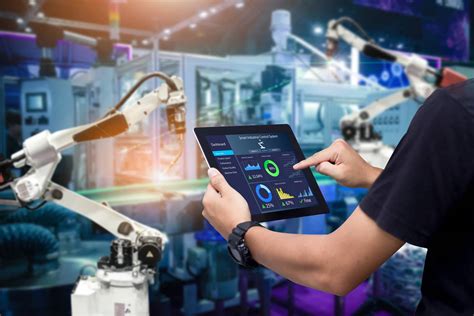The manufacturing industry has undergone significant transformations over the years, driven by advancements in technology and changing market demands. The integration of innovative manufacturing technologies has not only improved efficiency and productivity but also enabled the creation of complex products with unprecedented precision. From robotics and artificial intelligence to 3D printing and the Internet of Things (IoT), these cutting-edge technologies are revolutionizing industries and shaping the future of manufacturing.
The Rise of Industry 4.0
The fourth industrial revolution, also known as Industry 4.0, is characterized by the convergence of physical and digital systems. This transformation is driven by the integration of technologies such as robotics, machine learning, and IoT. Industry 4.0 enables the creation of smart factories, where machines and systems communicate with each other, and data is analyzed in real-time to optimize production processes.

Key Technologies Driving Industry 4.0
Several technologies are driving the Industry 4.0 revolution, including:
- Robotics and Automation: Robotics and automation enable manufacturers to streamline production processes, reduce labor costs, and improve product quality.
- Artificial Intelligence (AI) and Machine Learning (ML): AI and ML algorithms analyze data from sensors and machines, enabling real-time decision-making and predictive maintenance.
- Internet of Things (IoT): IoT enables the connection of machines, sensors, and systems, facilitating data exchange and creating a digital twin of the physical production process.
- 3D Printing and Additive Manufacturing: 3D printing and additive manufacturing enable the creation of complex products with unprecedented precision and speed.
Applications of Innovative Manufacturing Technologies
Innovative manufacturing technologies have far-reaching applications across various industries, including:
Aerospace and Defense
The aerospace and defense industries are leveraging innovative manufacturing technologies to produce complex components and systems. For example, 3D printing is used to create aircraft engine components, while AI and ML are employed to analyze data from sensors and predict maintenance needs.

Automotive
The automotive industry is adopting innovative manufacturing technologies to improve efficiency and reduce costs. For example, robotics and automation are used to streamline production processes, while IoT enables the connection of machines and sensors to optimize production planning.
Healthcare
The healthcare industry is leveraging innovative manufacturing technologies to produce customized medical devices and implants. For example, 3D printing is used to create customized prosthetics, while AI and ML are employed to analyze medical data and predict patient outcomes.
Benefits of Innovative Manufacturing Technologies
The adoption of innovative manufacturing technologies offers numerous benefits, including:
Improved Efficiency and Productivity
Innovative manufacturing technologies enable manufacturers to streamline production processes, reduce labor costs, and improve product quality.
Increased Competitiveness
The adoption of innovative manufacturing technologies enables manufacturers to stay competitive in a rapidly changing market, where speed, agility, and innovation are key.
Enhanced Product Quality
Innovative manufacturing technologies enable the creation of complex products with unprecedented precision, leading to improved product quality and reduced defect rates.
Reduced Costs
The adoption of innovative manufacturing technologies reduces labor costs, energy consumption, and waste, leading to cost savings and improved profitability.
Challenges and Future Directions
While innovative manufacturing technologies offer numerous benefits, there are also challenges to be addressed, including:
Cybersecurity Risks
The increased connectivity of machines and systems in Industry 4.0 environments creates cybersecurity risks, which must be mitigated through robust security measures.
Workforce Development
The adoption of innovative manufacturing technologies requires a workforce with new skills and competencies, including data analysis, programming, and robotics.
Standardization and Interoperability
The lack of standardization and interoperability between different systems and machines creates challenges for manufacturers, which must be addressed through industry-wide standards and protocols.
Gallery of Innovative Manufacturing Technologies





Frequently Asked Questions (FAQ)
What is Industry 4.0?
+Industry 4.0 is the fourth industrial revolution, characterized by the convergence of physical and digital systems.
What are the key technologies driving Industry 4.0?
+The key technologies driving Industry 4.0 include robotics and automation, AI and ML, IoT, and 3D printing and additive manufacturing.
What are the benefits of adopting innovative manufacturing technologies?
+The benefits of adopting innovative manufacturing technologies include improved efficiency and productivity, increased competitiveness, enhanced product quality, and reduced costs.
In conclusion, innovative manufacturing technologies are transforming industries and shaping the future of manufacturing. As manufacturers continue to adopt these technologies, they will experience improved efficiency and productivity, increased competitiveness, enhanced product quality, and reduced costs. However, challenges such as cybersecurity risks, workforce development, and standardization and interoperability must be addressed to fully realize the benefits of Industry 4.0.
